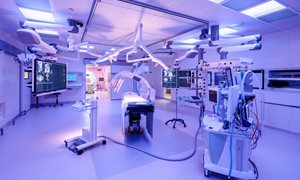About this research group
We perform early Health Technology Assessment (HTA) research through the early assessment of the potential value of innovative techniques and approaches to optimize the efficiency and effectiveness of surgical interventions.Aims of this research group
Innovative surgical technologies are being developed and introduced in clinical practice at a dizzying pace. We need to question how value can best be added in healthcare, and how this can be considered in the development and evaluations of surgical innovations. read moreMaroeska Rovers explains
"If an operation is the best treatment for one patient, this does not automatically mean that the same operation is also the best option for another patient. Ultimately, we want to have personalised treatment for each patient." read interviewMaroeska Rovers explains
Every day, hundreds of patients undergo surgery. Are all these operations really necessary? And has the best surgical method been chosen? The Evidence Based Surgery group investigates the usefulness and necessity of surgical interventions. Evidence Based Surgery is a research group within the Department for Health Evidence. We belong to a relatively new research discipline that investigates the usefulness of surgical techniques, whether or not they are cost-effective and if so, for which groups of patients.
Q1 Surgery: yes or no?
To investigate the usefulness and effectivity of surgery.
''We investigate which surgical techniques are used and whether or not they are necessary. After all, if an operation is the best treatment for one patient, this does not automatically mean that the same operation is also the best option for another patient. Ultimately, we want to have personalised treatment for each patient. The aim of our research is to develop methods to make this personalised medicine more feasible. We also evaluate new surgical techniques. For example, is an operation conducted by a robot better than an operation conducted by a surgeon? Or is there no difference? Is it cheaper? And is it safer?''
Q2 Do you compare various new surgical techniques?
''We compare various new surgical techniques. How do we do that? We work together with companies in the biomedical sector and the University of Twente. After they have demonstrated that a new technique appears to work, we will test it in the clinical setting by means of patient-oriented research. This means that we compare the new technique with the best available alternative.''
Q3 What is the ambition for the near future?
''Our ambition for the near future is to reduce all diagnostic and therapeutic oncological interventions to a single day (instead of the current range of 6 weeks, beginning with the surgical intervention, waiting for the results from the pathologist and ending with the preparation and initiation of the treatment plan). Our ultimate objective is to achieve more efficient health care while simultaneously improving both short-term and long-term outcomes for the patient (quality of life, satisfaction, use of painkillers, recovery time, etc.). Innovative technology helps us achieve this goal, but is not the primary aim of the project.''
Q4 What about innovation?
''Innovation must prove itself in studies into effectiveness, efficiency, safety and likelihood of implementation. Evidence-based surgical research is crucial to the introduction of evidence-based innovation. Our aim is to determine cost effectiveness and safety and to compare new techniques with conventional techniques and standards.''
Maroeska Rovers
“Little research has been conducted into surgical techniques, costs and cost-effectiveness. A great deal of progress can still be made in this area. I want to be involved in this research, which integrates technology, ethics, methodology and societal aspects. We maintain continuous contact with both physician and patient. In this way, we ensure that the interests of both parties do not diverge.”

MITeC Connected operating rooms, for advancing innovation in patient care
MITeC offers unique consulting services and expertise to incorporate newly developed medical technology innovations and accelerate their success rate.
go to page
